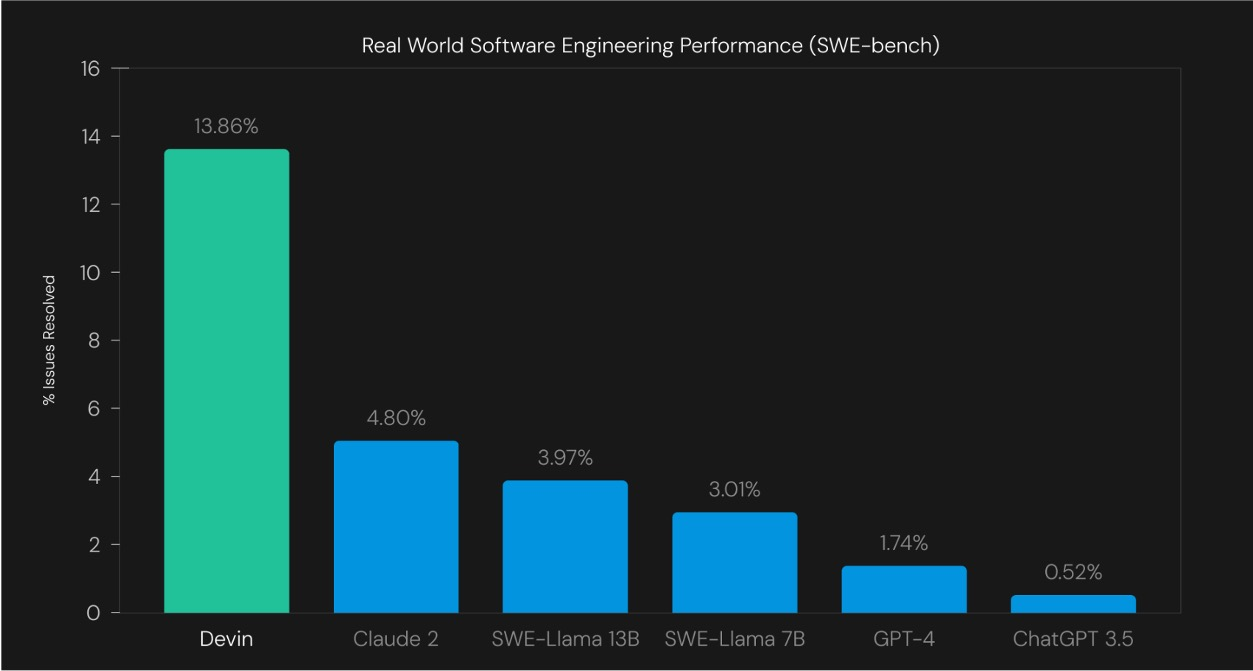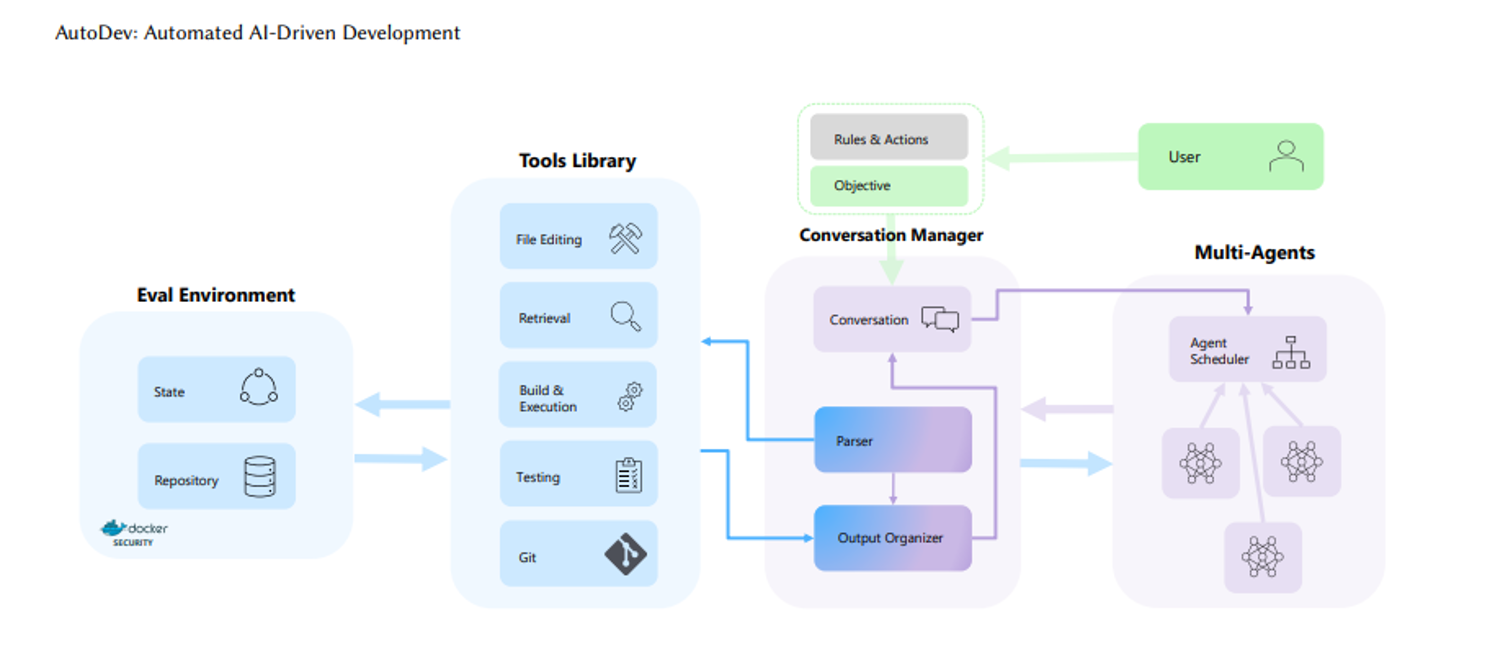Devin AI – The future of software engineering
Similar to the upheavals in agriculture, which has transitioned from manual labor to automated and data-driven processes over a century, software developers are experiencing a similar evolution. Artificial intelligence-based systems such as Devin AI represent a new generation of tools. These AI assistants are able to automate the solving of simple routine tasks in the development process. This will trigger a revolution in data science.
The key role of the AI engineer in technological evolution
AI Engineers, the human minds behind Devin AI, are constantly expanding the possibilities of automation and machine learning. As architects of intelligent systems, they are driving the transformation of various industries. They specialize in the development and implementation of AI solutions. The focus is on algorithms for machine learning and deep learning, which enable machines to learn autonomously from data and make decisions.
These experts are also well-versed in Natural Language Processing (NLP), which is essential for processing human language in AI software. You are proficient in advanced programming languages such as Python, Java, C++ and new AI frameworks such as Langchain, llamaindex and DSpy. This makes it possible to create robust, scalable and secure applications. Her work also includes integrating AI technologies into existing systems and cloud platforms as well as working with data scientists to optimize AI systems by testing and developing data-driven models.
As an AI-based developer, Devin AI embodies the future of software development. As an assistant, it simplifies programming work and enables developers to work more efficiently and precisely. The next section explains how Devin AI puts these theoretical concepts into practice.
Devin AI in action: a look at the practice

The bar chart shows a comparison of the percentage solution rate of GitHub problems using different AI models. Devin leads the chart with a remarkable rate of 13.86%, followed by other models such as Claude 2 and various versions of SWE-Llama and GPT.
Devin AI has a 13.86% solution rate for Github problems. This far surpasses the performance of its predecessors and contemporary AI models. Claude 2, the next in the ranking, solves only 4.80% of the issues. Models such as SWE-Llama 13B, SWE-Llama 7B and GPT-4 are even further behind. It should be particularly emphasized that Devin AI leaves its predecessor ChatGPT 3.5 far behind.
This makes it a valuable tool for developers. It is able to identify code errors, suggest solutions and implement them independently. This approach speeds up troubleshooting. He also improves the quality of the code by applying proven methods and techniques.
AutoDev
The latest framework from Microsoft, often referred to as “Devin AI 2.0”, represents a comprehensive solution. It overcomes the limitations of conventional AI assistants such as GitHub Copilot. With the difference of not just suggesting code snippets, but planning and executing the entire development cycle autonomously with the help of AI agents.
The AI agents belonging to AutoDev are able to handle a wide range of tasks in a code base. The tasks include code retrieval, build processes, test execution and Git operations. You have access to tools and outputs, such as compilation statistics, build and test logs, and use advanced analysis tools. This makes it possible to work in a fully contextualized developer environment.
It creates a secure developer environment that also integrates protective measures to safeguard user privacy and file security. AutoDev thus represents an innovative advancement in automated software development.
Technical architecture of AutoDev

Devin AI 2.0/ AutoDev: an automated AI-driven development environment
AutoDev’s architecture is characterized by its modularity and scalability. This allows individual components to be adapted or expanded according to the changing requirements of software development projects.
The Eval Environment guarantees software status and repository management in a secure Docker environment. This enables continuous testing and validation during the development phase.
The Tools Library offers a wide range of tools for editing and building software. This enables flexible and responsive development work.
The integration of the Conversation Manager demonstrates the interactivity of the system. It balances user needs and goals through clear dialog with the system. This is where user input is analyzed, interpreted and converted into executable actions.
A decisive aspect of AutoDev is the multi-agent system, which enables the parallel execution of tasks and thus a high level of efficiency thanks to an agent scheduler. This collaborative approach allows AutoDev to work simultaneously on different fronts and still deliver consistent and reliable results.
Challenges and limits
Despite these successes, there were also challenges and limitations during the demo phase. One specific example of such a challenge is a persistent error that occurred after numerous iterations and highlights the limits of Devin AI’s capabilities.
It emphasizes the need for continuous monitoring, maintenance and improvement of the system. This ensures the longevity and reliability of AI-driven development processes.
The experience with this error raises significant questions about the fulfillment of the ambitious promises of AI technology. Especially with regard to their application in complex, rapidly evolving environments such as software development.
Summary and outlook
Devin AI and AutoDev exemplify the transformative power of artificial intelligence in software development. These systems not only provide tools, but also act as autonomous thinking partners that accelerate development cycles and raise quality standards. Their ability to generate code, solve problems and manage development cycles shows the enormous potential of AI-based software development.
Although these solutions still offer room for improvement and do not guarantee 100% reliability, they nevertheless provide a considerable productivity boost by automating daily routine tasks. The current demos and further developments only give a taste of the potential that will be further developed in the coming years and months.
The future promises an even deeper integration of AI into the development process. Challenges such as fault detection and rectification are addressed through continuous research and development.


